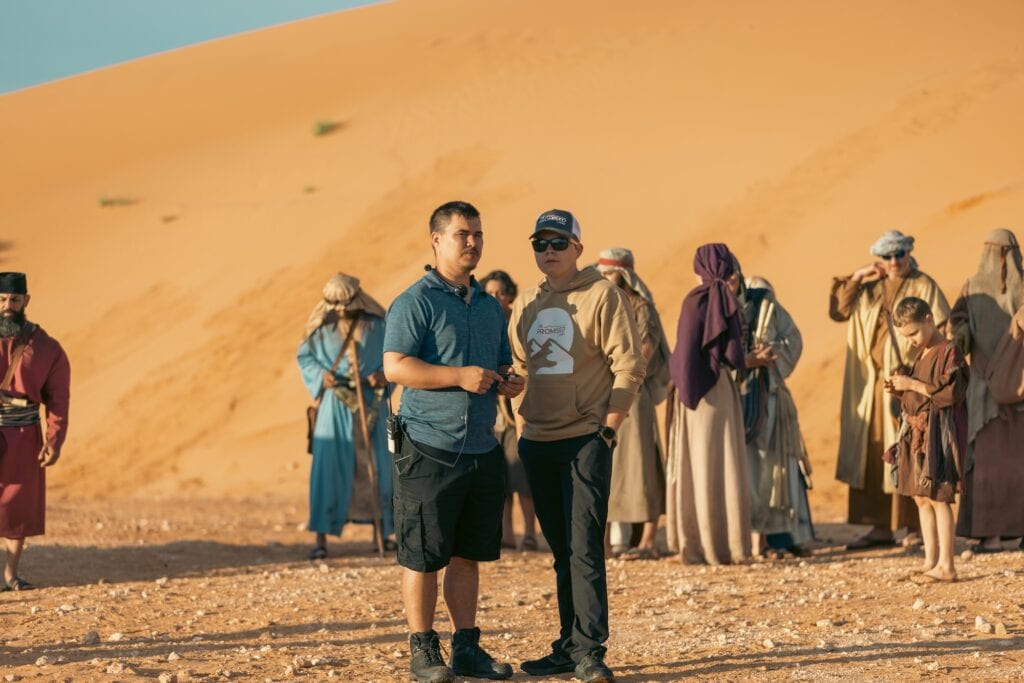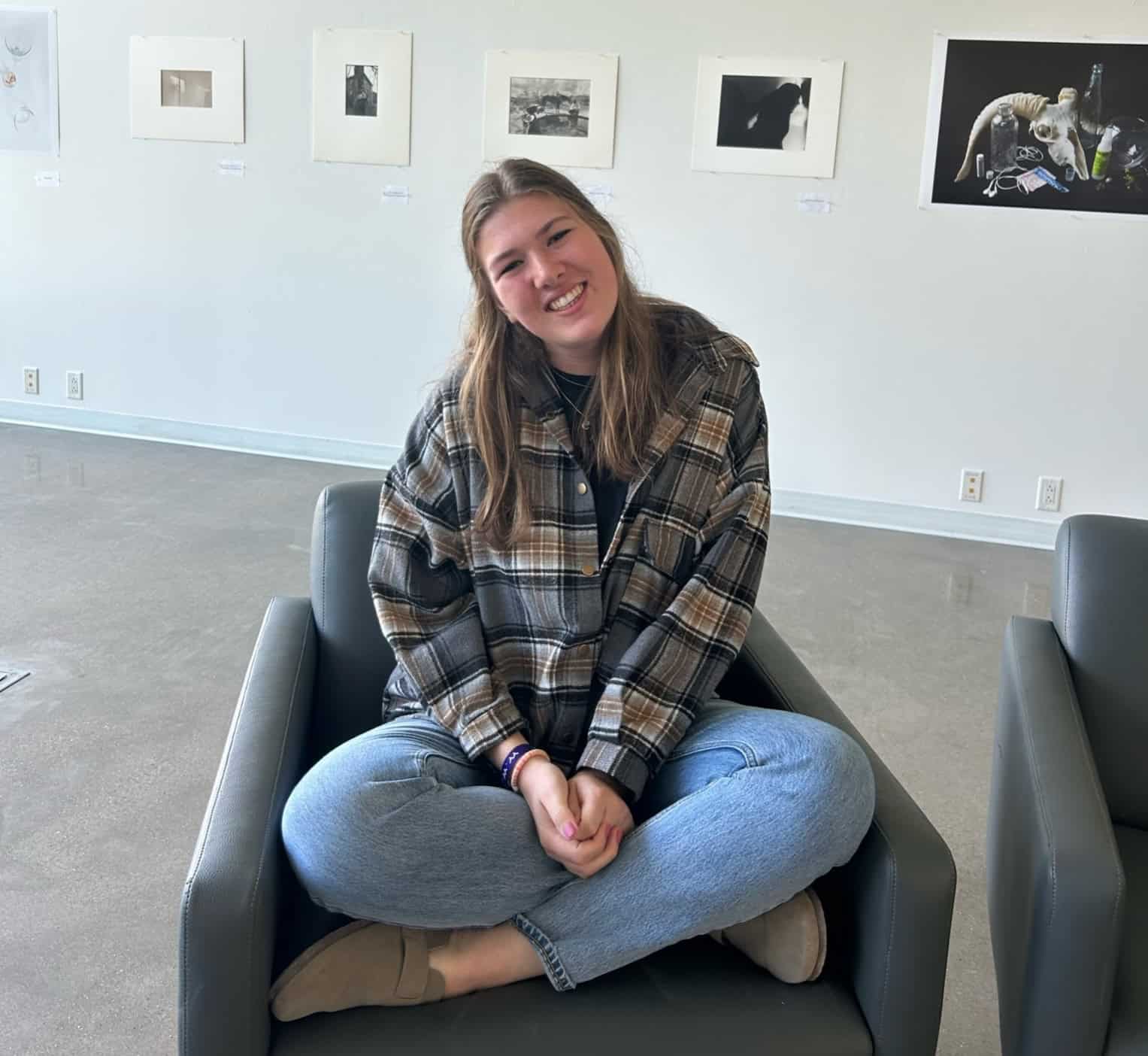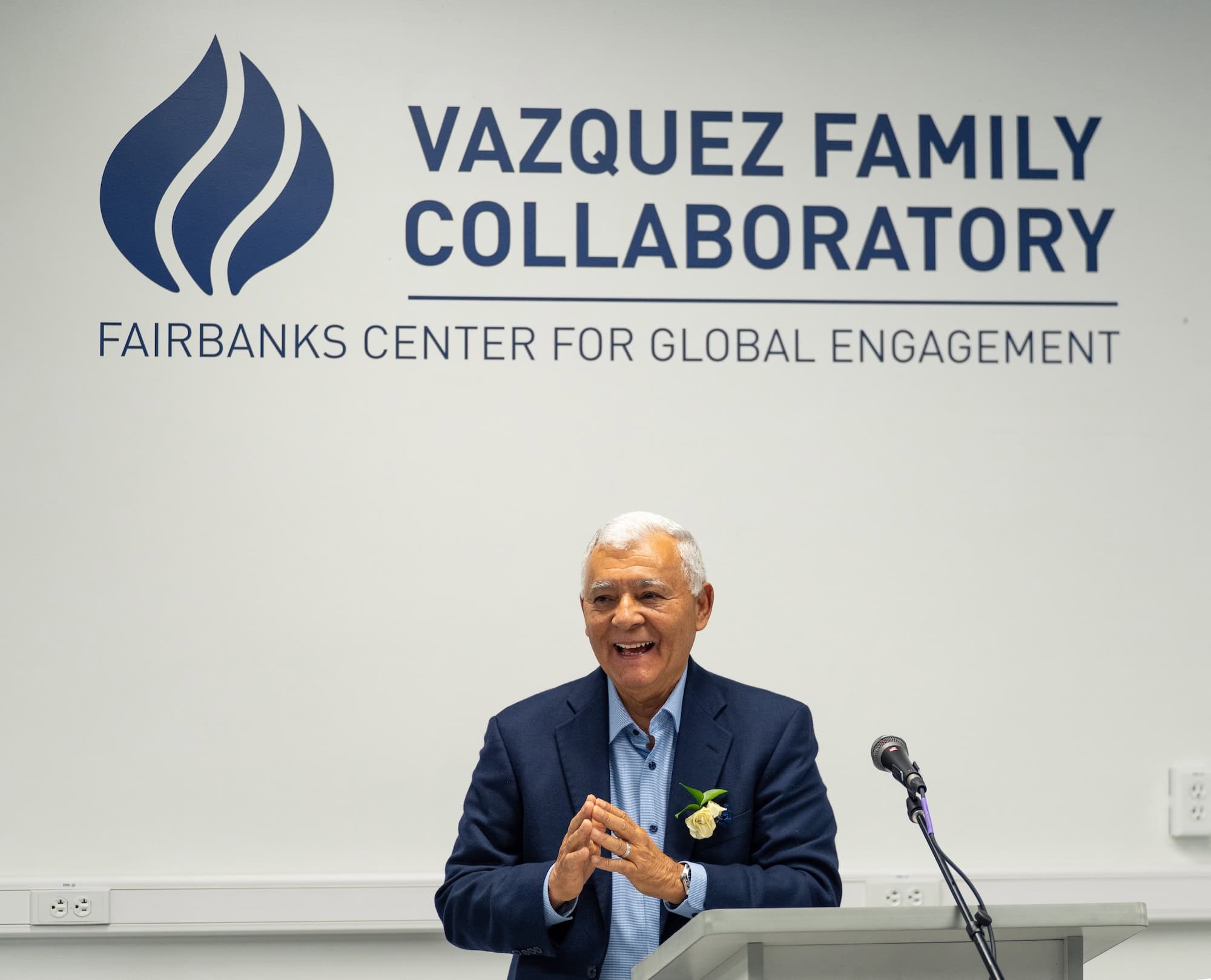Alumni using film to share hope, Gospel
For Richie and Bethany (Richardson) Johns '20, “To seek to learn is to seek to serve” was more than just their college motto. It describes their way of life. Together they are impacting the world with the love of Christ through film and television.
June 18, 2025
- Alumni
- The Flame

MOUNT VERNON, Ohio — For Richie and Bethany Johns, ‘To seek to learn is to seek to serve’ was more than just their college motto. It describes their way of life.
As 2020 graduates of Mount Vernon Nazarene University, Richie and Bethany (Richardson) together are impacting the world with the love of Christ through film and television. The Johns own and operate Studio 523, a Christ-centered movie/television production company based out of Atlanta, GA, but with ties to MVNU.
Studio 523 had humble beginnings, taking shape in the lively MVNU Campus Center where Bethany and Richie first registered it as an LLC. Following their marriage after graduation, it began to take off.
“Studio 523 really embodies who we are as a couple, and we want it to continue to do so,” said Bethany. “Our marriage is the foundation of everything that we do. He doesn’t make a business decision without me and vice versa.”
Richie added, “Ultimately, it’s our mission to tell stories that inspire hope. And for me, that’s something I’ve loved doing. … I’ve always loved the creative side of film — the people, the process — but you need both the creative and the practical to make it work. … Our skills very much complement each other, and that was a goal for us as a husband-and-wife team in this industry.”
Today, they are deeply involved in every aspect of film production. They direct, produce, and often find themselves ministering to those around them. It’s that ministry that drives them.
“Our calling is to communicate the gospel through the medium of film and television, but we can even take it a step further to narrow that down for the millennial and Gen Z audience,” Bethany said. “When you talk to a lot of people who are millennials or Gen Z, they’re very hopeless. You look at our political landscape and the economic landscape. You look at our churches. There are not a lot of young people in them. We were like, ‘What does our generation, what does our audience need the most?’ and we landed on hope. That’s something that we feel has resonated with so many people.”
Their commitment to fostering hope through their work has become a defining force, influencing both their projects and their personal relationships.
Their latest project, The Promised Land, went viral following its YouTube debut on July 1, 2024. With over 1.5 million views in just nine months, the pilot episode has validated what the Johns already believed: there is a strong demand for stories that inspire hope.
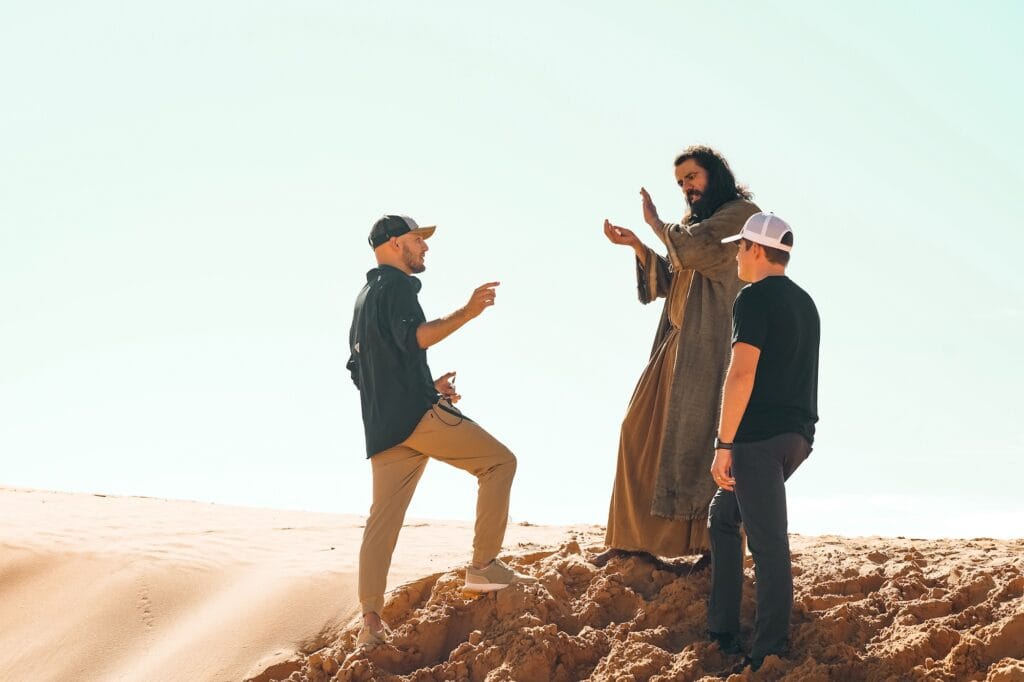
“The whole idea is telling the story of Moses and the Israelites wandering in the desert for 40 years, but shot in the comedy style of The Office, Parks and Recreation, and Modern Family, etc.,” Richie said. “The actors sit down, look directly into the camera, and your able to hear from them from firsthand.”
Despite considerable interest from studios, many were hesitant to fund a full season due to the unconventional nature of the show.
“Biblical comedy doesn’t exist. It isn’t a genre,” Richie said. “The (YouTube) release was to show two things: there’s an audience for this, and to really build our tribes, our following. We have a great marketing team based in Nashville that has been tremendous. They understand the project and our audience — people that grew up going to church or grew up watching VeggieTales, and now they have kids and are millennials or Gen Z that love The Office.”
Richie also noted the surprising response from nonbelievers and those not actively practicing their faith.
“We get so many comments from people saying, ‘I don’t even believe this, but I want to watch this series, or I used to go to church, and I haven’t read Exodus in a long time. I opened up my Bible again.’ … We’re hoping that it continues to grow, and more people continue to watch and share it.”
While The Promised Land uses comedy to share the gospel, Richie is primarily concerned with ensuring that the content remains biblically accurate.
“Ultimately, the goal is to be scriptural,” Richie explained. “Often, you watch Christian movies or faith-based projects where 80 percent of is well done. But there’s always that 20 percent that doesn’t align with my beliefs. You’re like, ‘Yeah, that’s not really right.’ For me, it was important to have that Wesleyan-Armenian background, what I believe in, especially within our Nazarene tribe. So that was important for me in what I’m doing, making sure that it’s theologically sound and know what we’re communicating through this medium.
“It’s crazy how a small idea like The Promised Land started and the way God has been able to multiply our loaves and fish with this project.”
Preparing for the call
From a young age, Richie had an interest in movies and the film industry. At the same time, he felt a distinct calling from God on his life.
“Part of my story is that I felt a calling to ministry after a mission trip to Nicaragua when I was in middle school” Richie shared. “I’ve always had different mentors and a love for filmmaking. I never initially thought that the two would combine.”
In high school, Richie and some friends made their first film, solidifying his path in directing and producing.
“My senior year of high school, two of my closest friends and I made a feature film,” told Richie. “We adapted the book of Ruth into a modern version, kind of like a Hallmark story. My church helped us produce it, and we had volunteer actors. … We used my high school’s film equipment, and it ended up being like a full-length feature movie. I had no clue what I was doing, but then it showed for six weeks in my hometown theater in eastern Ohio.
“At that point, I knew that that’s what I was supposed to be doing for the rest of my life — storytelling. I had a clear calling, and it guided my college choices, especially deciding on (MVNU). I knew I wanted to ultimately communicate the gospel through the medium of film and television.”
For Bethany, on the other hand, filmmaking had never crossed her mind. One fateful day on the MVNU campus changed that and much more, however, for the two fourth-generation Nazarenes.
Once two became one, though, who they were and what their mission field was became clear.
“Richie obviously was called to this unique form of ministry, so I had to wrap my head around, ‘What does the ministry look like in this capacity? Is this something that I can see myself being a part of long term?’” said Bethany. “When we came to the conclusion that we want to get married and we wanted to build a life together, then we said, ‘What does that look like?’ We knew from the get-go we didn’t want it to be a life where Richie traveled, and I stayed home. We really wanted it to be something that we did together, alongside each other.
Bethany noted that their work in film production involves significant hands-on ministry, engaging with people from diverse backgrounds and beliefs.
“I think that’s probably the biggest way that (MVNU) has impacted what we do,” she said. “I remember being in the honors program, and I took Discipleship of the Christian Mind with Dr. (Brett) Wiley. The one big thing that he really focused on was worldview and understanding how we see the world. He did a really good job of preparing us to be open minded to people that are different than us while being true and faithful to the gospel. I think (MVNU) did a really good job of preparing us to be good leaders, and to be the salt and light, because even though we work in the faith-based industry, it’s still a very dark world.”
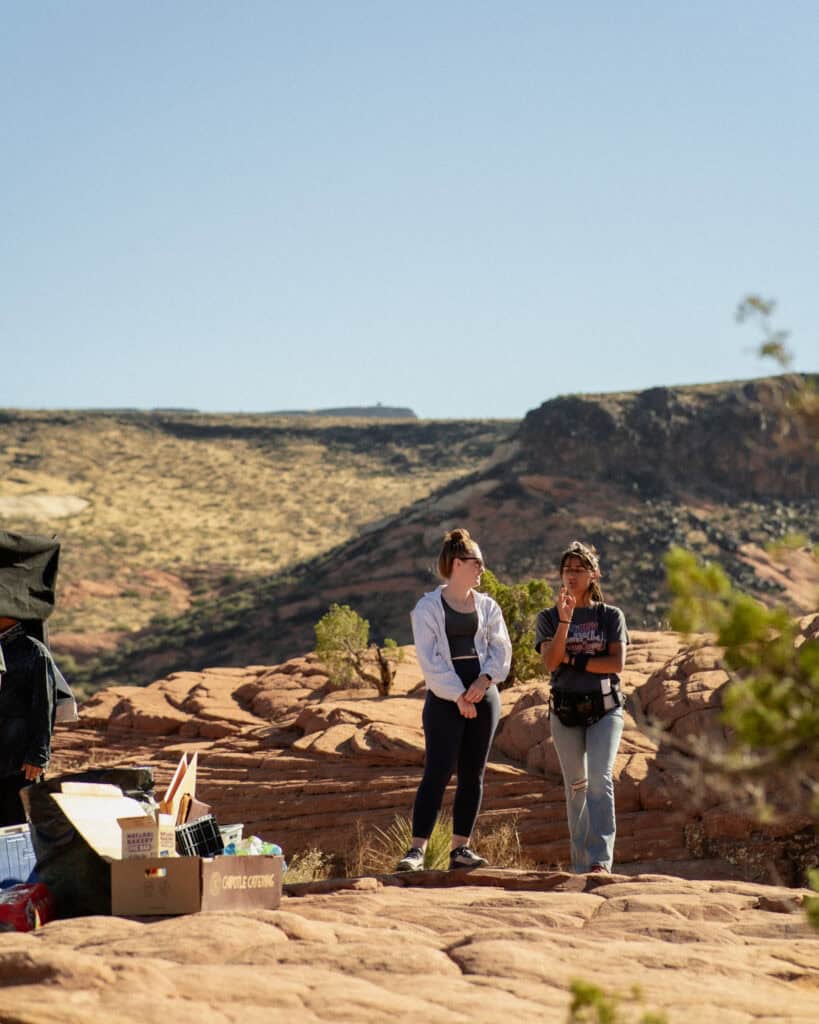
Servant Leadership
Recognizing their calling and their ability to be part of something special, the Johns have dedicated themselves to focusing on those around them. This commitment to selflessness, learned early in life and reinforced at MVNU, drives their approach.
“For us, producing is ministry,” Bethany explained. “Making a movie is like building a brand-new business from the ground up. You get your tax filings taken care of, and then you build your leadership and build teams under those leaders. Every project is kind of like its own little mini business.
“I did not come to MVNU planning to go into film,” she admitted. “If you had told senior in high school Bethany that she was going to make movies for a living, I would have laughed and told you, ‘Yeah, that doesn’t actually happen.’ I came to (MVNU) to get my degree in mathematics. I had a very clear-cut corporate future planned. Then I met this guy, and he told me he wanted to make movies. I went, ‘Yeah, that doesn’t happen. Good luck with that one.’ This is not an industry I ever thought I would be in. Certainly not something that I have any actual qualifications or training in.”
She continued, “Leadership defines your culture. When we view producing like ministry, we are looking at, What type of culture do we want to create on set? What type of environment do we want to create? How healthy can it be? How encouraging can it be while also getting more done, because we have budgets and investors that we have to be held accountable to. For us, ‘To seek to learn is to seek to serve’ drives every project because we always learn something new. But in every project, we’re also learning ways that we can better serve our crew. “
Bethany emphasized their commitment to servant leadership, noting the demanding nature of the industry.
“In our industry, 12-hour days are totally normal, and some weeks, 18- or 20-hour days are normal, she said. “We take that extra step, so our crew isn’t overburdened. The biggest takeaway that we have learned is how to serve others and how to be better leaders. It’s about going that extra mile and giving more of ourselves than maybe what is required by our job description.”
Richie’s experience on other projects has shaped his perspective on leadership. It has taught him who he wants to be and how to get there.
“Working on big movies, even a small capacity, has taught me the Hollywood system is very top down,” Richie said. “Sometimes people are being belittled and it’s a tough environment. That’s why I love producing. It is about setting expectations, leading from the ground up and setting the culture. I think there’s multiple facets because you’ve never arrived in the film industry. You’re always learning, and you’re always trying to improve, but the idea of service, for me as producers, is everything.”
He added, “When people see that we’re out there with them, like Bethany’s cleaned up dead animals on the film set — not that we killed them, but they were already dead — or taking out the trash, it changes the dynamic. This idea of servant leadership was modeled to me at an early age, and I want to continue that on the film set. Yeah, I’m the producer — I’m the boss. I’m managing the budget and crew of 80 to 100 people or however big that the project is, but by being willing to serve in ways that people don’t really expect — and that was modeled to me at (MVNU) — is impactful. I want to continue to model it in our production company.”
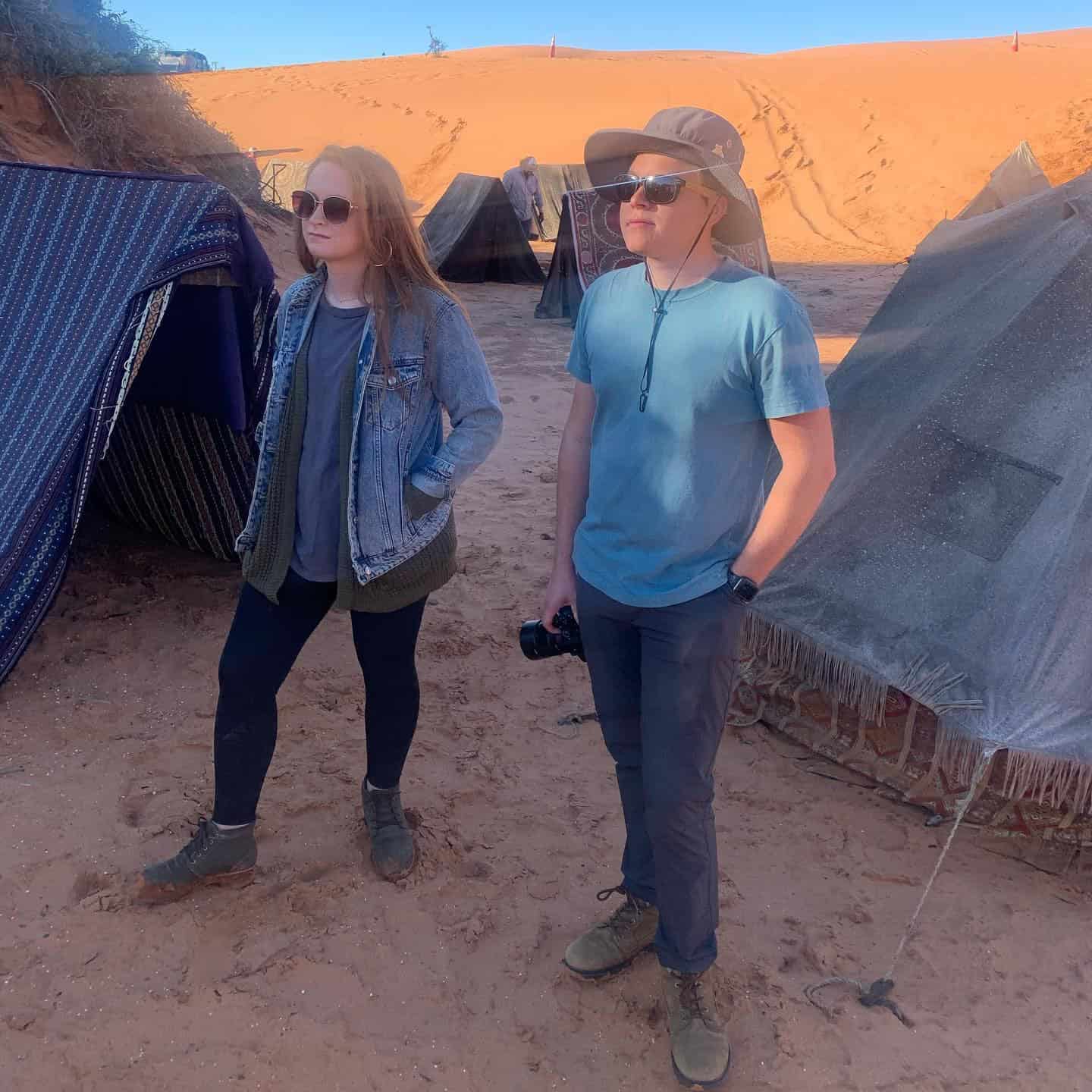
Starting Small
The Johns began their journey with smaller projects, such as wedding videos, commercials, and work for nonprofits. These early endeavors laid the foundation for larger opportunities to come.
Reflecting on those experiences, Richie noted, “Looking back, there’s been a lot of ways that God was using us, ways we didn’t even realize at the time.”
A significant turning point for Richie was working on The Chosen series. With connections to friends involved in the show, Richie eagerly accepted an invitation to join the set in Texas.
“Season two was my first time working on The Chosen,” recalled Richie. “I’ve worked on a lot of the big events. At the time, it was the Sermon on the Mount. We had 2000 extras that week. At that point, I had been working a lot in the band as a background production assistant — really like herding cats, nothing glamorous. I was just telling people, ‘Go over there or do this or sit down or whatever. I learned a lot of the management side of things. I had a very small role, helping the assistant directors at the time manage the team.”
Richie added, “Then it kind of became a tradition. I worked on season three with the Feeding of the 5,000. During that course of the week, I think there were 12,000 extras.”
Seeing the bible stories come to life firsthand is something that has impacted the Johns in a big way.
“The feeding of the 5000 was such a surreal experience,” Richie said. “To see the story come to life — it was something I heard a hundred times growing up in children’s church — but then being able to be there and experience it. You think very practically about how this many people heard Jesus, because they didn’t have speaker systems back then. Then the miracle, of course, between the loaves, the fish and the boy. He just gave all that he had. Seeing that come to life was surreal.”
Earlier this spring, Richie and Bethany participated in season five of The Chosen in Utah, working at the Jerusalem set.
“It was also surreal because this season is Holy Week,” Richie said. “Both of us were involved in serving thousands of background actors who are all fans of the show. … The best way to be the hands and feet of Jesus on the film set is to be a production assistant, because you’re literally your whole job is to just serve anybody and anyone.”
While different from his current project The Promised Land, The Chosen has helped lay the groundwork and set the tone needed to succeed.
“One of the things that’s been so great about The Chosen is they are who they say they are. I’ve been on other faith-based projects where the culture isn’t at all what they’re communicating on screen and that’s very frustrating for me. … The Chosen is a great model, and they are doing it well. And I’ve seen it across multiple seasons, even as they’ve grown now. They’re a completely different show than when they started at season one. They have a much bigger cast and a lot more money, and the scale is huge. But they’ve kept their identity as a production that’s good at telling stories to the world about this authentic Jesus and who Jesus really is — both God and man. … The Chosen has been a wonderful experience that we’ve been able to be a part of.”
Moving forward
Shows like The Promised Land and The Chosen have underscored a significant truth for the Johns: there is a strong demand for faith-based content. While mainstream media may not fully address this need, the enthusiastic response to these projects reveals a clear appetite for such stories.
“We have these tribes that are forming that want more of this content,” Richie said. “So, we want to continue to tell stories like this that people actually want.”
Studio 523, led by the Johns, is currently developing three new projects, each with a distinct narrative but united by a common theme of inspiring hope.
“One is a feature that we shot last fall and will be coming to theaters in 2025. It’s a beautiful story about forgiveness,” Bethany said. “Richie got to direct that one, while I produced. That was a lot of fun and some uncharted territory for us. It’s about the power of mental health facilities and recovery centers, specifically in the sex trafficking trade. We partnered with a nonprofit in Texas that is a rehabilitation center for these women. We took two of their stories and kind of combined them into one to tell their story. … Although we have a working title, we’re holding off on revealing it until it’s finalized. … The project had a lot of impact on us, both emotionally and spiritually, and made us question a lot about our spiritual maturity.”
The Johns are also working on a docuseries in partnership with Wendall Brown and the Tragedy into Triumph organization, a non-profit that has conferences and simulcasts that tell stories of overcoming adversity.
“Wendell has done, some really good work there,” Bethany explained. “We shot a proof of concept in the spring with coach Mark Richt, formerly of the University of Georgia. We’re currently fundraising for that and hope to go into production next year.”
Additionally, a project that originated from relationships formed during their time at MVNU is in the works.
“It is really a love letter to pastors,” Richie said. “One of my professors from (MVNU) pitched this project to me — it came out of Covid. It is a love letter to pastors about all the things they have to go through. Coming out of Covid there was so much division in the church — masks or no masks, and vaccines or no vaccines. Then the election and Black Lives Matter — there was much division. Often, pastors are stuck in the middle and you don’t even realize all the ways that they have to try to unify their congregation. There is so much division sometimes that separates churches, and that weighs on pastors.
Richie continued, “It’s the story of a pastor whose burnt out from ministry and takes a temp job at the local grocery store. It’s a comedy/drama — a fish out of water story — about this pastor that’s in a place that is an unlikely environment for him. He begins to find healing in an unlikely place, in the aisles of this grocery store. … We shot the proof of concept earlier this year and right now it’s in post-production. Later this year, we’ll pitching it to different distribution companies.”
For more on the Johns and Studio 523, visit studio523.co.
